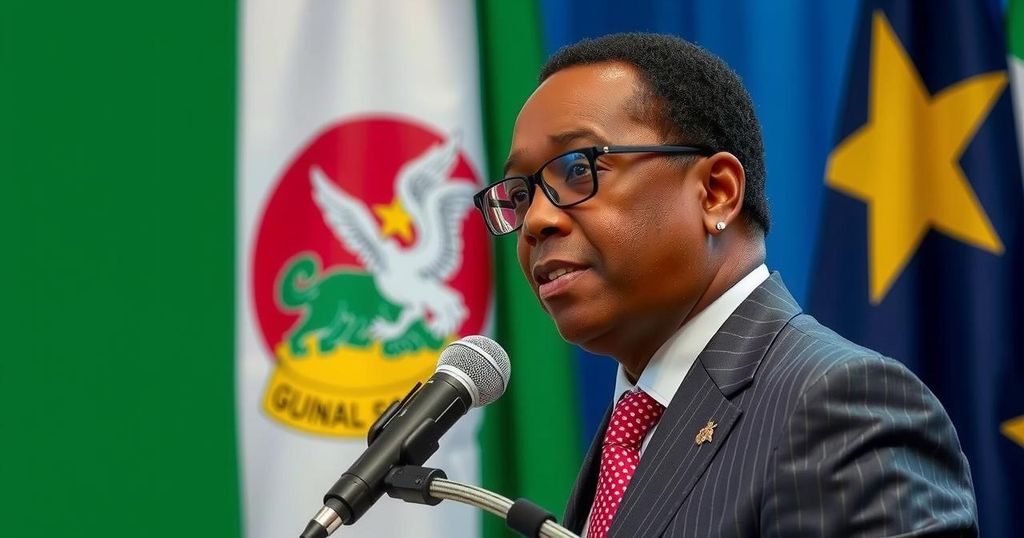Equatorial Guinea President Dismisses Official Over Scandalous Videos

Baltasar Ebang Engonga was dismissed as Director General of the National Financial Investigation Agency in Equatorial Guinea following the emergence of explicit videos featuring him with multiple women. His removal is part of a larger governmental effort to address sexual misconduct among officials, as Vice President Teodoro Mangue promised severe measures against such behavior. The First Lady expressed disappointment over the incident, which she termed an embarrassment to the nation’s women.
The government of Equatorial Guinea has officially removed Baltasar Ebang Engonga from his position as Director General of the National Financial Investigation Agency (ANIF), amid scandalous allegations regarding his conduct. Engonga’s dismissal follows the emergence of explicit social media videos purportedly depicting him engaging in sexual activities with numerous women. Initial suspensions were imposed when the videos, allegedly involving over 400 women, were leaked, prompting widespread public scrutiny and outrage. The President of Equatorial Guinea, Teodoro Obiang Nguema Mbasogo, ordered Engonga’s termination through a formal decree signed by his great-uncle. Notably, the former director’s familial ties include his father, Baltasar Engonga Edjo, who holds the position of President of the Economic and Monetary Community of Central Africa (CEMAC). Despite the gravity of the situation, Engonga has refrained from publicly commenting on the allegations, although efforts by media outlets to obtain his stance have been unsuccessful. In a broader context, Vice President Teodoro Mangue has announced intentions to implement stringent measures against officials partaking in sexual misconduct within government offices. Following the viral spread of the explicit materials linked to Engonga, Mangue stressed the importance of maintaining public ethics and the necessity for accountability among officials. He openly declared that any such misconduct would lead to suspension and investigation. The disturbing content of the videos, released during an ongoing corruption inquiry involving Engonga, captured the attention of authorities prompting action to suppress further sharing. The attorney general has acknowledged the consensual nature of the acts depicted but mentioned potential legal repercussions if sexually transmitted infections, considered public health crimes, were involved. The First Lady, Constancia Mangue Obiang, expressed significant disapproval, labeling the incident as disgraceful and a damaging blow to the national reputation, particularly regarding the portrayal of Equatorial Guinean women in the public realm. Engonga, aged 54 and a father of six, has had a lengthy political career since starting as Education Minister in 1998 and later leading the anti-corruption efforts as director of ANIF. His recent downfall highlights severe breaches of public trust and ethical standards expected of government officials.
The event involving Baltasar Ebang Engonga underscores the critical issues of public ethics, trust in government, and the potential consequences of personal misconduct for public officials. Engonga’s dismissal serves as a notable example of the Ecuadorian government’s stance against corruption and inappropriate behavior within its ranks. The backlash against such conduct reflects societal expectations regarding the integrity of governmental institutions and the individuals who lead them, especially in light of the sensitive nature of the allegations addressing moral and public health concerns. The strong reaction from high-ranking government officials, including the Vice President and First Lady, illustrates the urgency with which the government is addressing these issues.
In summary, the dismissal of Baltasar Ebang Engonga as Director General of ANIF reveals significant repercussions for misconduct within the Equatorial Guinea government. The incident has sparked a wider discourse on ethics, accountability, and the image of public officials, with government leaders promising strict consequences for similar actions. The ongoing narrative suggests a commitment to uphold public integrity and respond decisively to breaches of conduct among its officials, highlighting the intersection of personal behavior and professional expectations in governance.
Original Source: gna.org.gh







